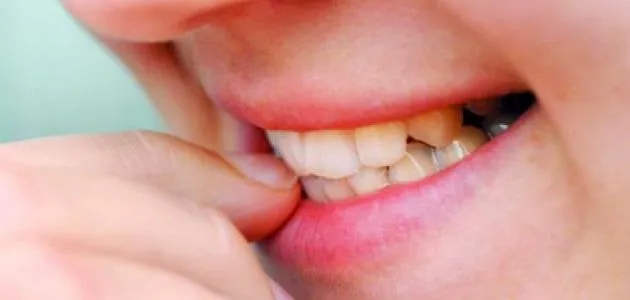In daily life, dental health and occlusion may face many challenges due to environmental factors and daily habits, as it should be noted that there are a group of bad habits that can harm oral and dental health, whether directly or gradually over time.
Through this article, we will review a number of these harmful habits that negatively affect the health of the teeth and jaws, and we will explain their possible effects and in addition, we will provide some tips and advice on how to avoid these harmful habits and maintain overall oral and dental health and if you want to maintain a healthy, beautiful smile for many years to come, read on to learn more about these habits and how to deal with them effectively.
What are the most prominent habits that harm the health of teeth and jaws?
The harmful habits that may affect the health of the teeth and jaws have varied greatly, and by avoiding them, one can maintain the prevention of many diseases related to the gums and dental malocclusion and below we review some of these harmful habits:
Sucking fingers
Thumb sucking is a normal phenomenon for young children in the teething stage, as the child usually begins this habit when he reaches the age of several months and continues until early childhood, ranging from 2 to 4 years, however, if the child continues this habit after the age of five years, this habit may become harmful to dental health, at this stage, permanent teeth usually appear, and the child’s continued thumb sucking can cause several problems, such as:
The upper incisors protrude, with or without a gap between them.
The lower incisors tilt inward.
Open bite.
The upper alveolar bone advances with the teeth.
Narrowing of the upper jaw.
A crossbite at the back of the mouth.
Increase the vertical dimension between the jaws.
Teeth grinding
Some people suffer from the problem of teeth grinding tightly together during sleep, which is a habit that is harmful to dental health and that the person may not be aware that he is doing it. This habit begins to be repeated gradually, and over time it may lead to negative effects on the teeth.
In some cases, signs and symptoms may appear that indicate a problem with teeth occlusion and friction against each other, and these symptoms include:
Jaw pain and headache.
Premature wear of the teeth, especially the enamel layer that forms the surface layer of the teeth, which may lead to tooth sensitivity and erosion.
Teeth are misaligned, which can affect the appearance of the smile and the function of the jaws.
Teeth breakage, especially in the back teeth, which are exposed to the greatest force during friction.
Thrust the tongue while swallowing
The habit of pushing the tip of the tongue forward, especially placing it between the upper and lower incisors, and trying to push the tongue forcefully during the process of swallowing food can cause the teeth to push forward and the upper incisors to diverge from the lower incisors, leading to what is scientifically called in dentistry a crossbite, as this habit is one of the habits that harm the health of the teeth and jaws, and may cause other problems as well, such as:
Eruption of upper incisors.
Formation of anterior spaces in the upper jaw.
Weak tension in the upper lip.
Incompetence between the lips.
Nail-biting
Nail biting is considered one of the harmful habits that affects the health of the teeth and jaws, as its effect is not only limited to cracked or eroded teeth, but it can also lead to weakness in the jaw in the individual and when a person bites nails, the jaws are positioned at unnatural angles, which in turn pushes the lower jaw out of its normal position and over time, this may lead to temporomandibular disorder, which is characterized by pain in the jaw.
In addition, nail biting can cause distortions and changes in the position of the teeth, with tilting or dislocation in some cases, which makes the person intend to undergo orthodontics to realign them in their correct place. Nail biting can also transfer harmful bacteria and fungi from the nails to the mouth, which increases the possibility of gum or tongue diseases.
This habit can be easily broken by trying to think of another habit or using nail polish as a way to reduce the urge to bite them.
Mouth breathing
Mouth breathing is a common habit, but it is very harmful to dental health and this breathing pattern affects the improper development of the jaws and teeth, and its continuation for a long period may lead to disorders of the face and jaws, such as:
Long face syndrome.
Posterior crossbite, either on one or both sides, which may be accompanied by a moderate anterior open bite.
Lower jaw retracted.
Narrowness and protrusion of the upper jaw.
Inflammation of the gums.
Inefficiency of oral dishes.
tooth decay.
It is certain that there are several habits that may be one of the main causes of tooth and gum diseases and malocclusion in individuals. Therefore, we must work to get rid of these habits that are harmful to the health of the teeth and jaws as soon as possible and the sooner attention and intervention are given, the better the results will be in terms of growth and development of teeth and jaws.
Related articles :
Hollywood smile in Istanbul
advantages of cosmetic dentistry in Turkey
Plastic surgery in Istanbul
Dental treatment cost in Turkey
advantages of laser teeth whitening in Istanbul
Types and risks of dental implants in Turkey
hair transplant techniques in Istanbul
Dental veneers in Turkey
Hair transplantation in Turkey
Types of orthodontics in Istanbul and their features
